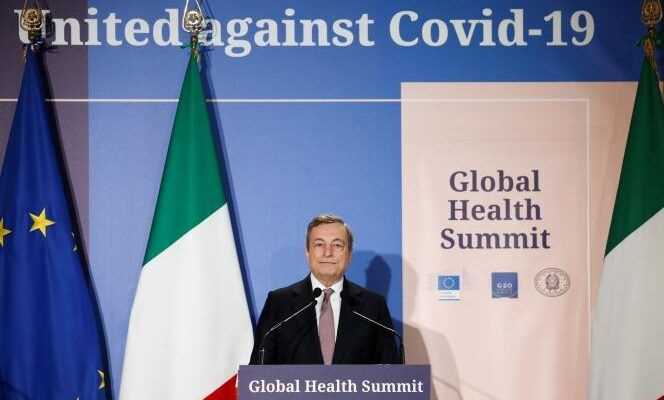Pharmaceutical companies and leaders of industrialized countries pledged, Friday, May 21, at the world health summit, organized in Rome, as part of the G20, to provide doses of vaccines against Covid-19 and several billion dollars in order to to help developing countries in their fight against Covid-19.
Currently, a third of the population in the richest countries has already received at least a first dose of the vaccine, compared to 0.2% in poor countries, according to Covax. By the end of May, 140 million doses will be missing from the international program, and another 50 million in June, compared to the volumes initially planned to immunize 20% of the population of poor countries.
To support the vaccine campaign in these countries, the Pfizer-BioNTech, Moderna and Johnson & Johnson laboratories pledged Friday to provide them at cost or reduced some 3.5 billion doses in 2021 and 2022. About 1.3 billion doses should be delivered this year, the rest in 2022. They will be accessible at cost price for low-income countries and at reduced prices for middle-income countries, said laboratory officials.
Europe and the United States, supporters of Covax
The European Union (EU) has announced that it will provide poor countries with 100 million doses this year. “Everyone, everywhere” must have access to vaccines, insisted European Commission President Ursula von der Leyen, while UN Secretary General Antonio Guterres criticized “Vaccine nationalism”.
For its part, France will give to the Covax program, which provides vaccines to poor countries, “At least 30 million doses of different vaccines” by the end of 2021, announced French President Emmanuel Macron. So far the United States has announced that it wants to give Covax 80 million doses, including 60 million AstraZeneca. France had already announced a donation of 500,000 doses by the end of June, and Sweden, 1 million doses.
In the wake of these declarations, Germany will also give, by the end of 2021, “Up to 30 million doses” to the Covax program, announced German Chancellor Angela Merkel. “On the German side, we are ready to give 30 million doses to the poorest countries, to the developing countries, by the end of the year, provided, of course, that the vaccines we have ordered arrive. effectively “, explained Mme Merkel.
“So far, 125 countries have received 70 million doses. But we know that money is not everything, the vaccine must also be available ”, warned Mme Merkel. In this sense, the French president said he was ready to support the lifting of patents on vaccines, subject to a joint report by the World Trade Organization (WTO) and the WHO deems it necessary to speed up the process. production in the world.
A $ 50 billion IMF plan
In front of the participants in this world health summit, the International Monetary Fund (IMF) also called for the strengthening of the international Covax system, arguing that there would be no “Enduring end” of the economic crisis without an end to the health crisis. The IMF has thus made a series of proposals with the primary objective of filling the vaccine gaps in many developing countries.
It’s about helping “To significantly control the pandemic everywhere for the benefit of all”, insists Kristalina Georgieva, Managing Director of the IMF. Thus, the authority stresses that it is necessary to grant additional subsidies to the international Covax system, by donating excess doses and ensuring free cross-border flows of raw materials and doses of vaccines. “Our proposal sets objectives, assesses financing needs and defines pragmatic actions”, summarized Mme Georgieva.
Funding for this plan, intended to end the pandemic, is estimated at $ 50 billion with a goal of vaccinating at least 40% of the world’s population by the end of the year, and at least 60% by the end of 2022.
“For some time now, we have been warning about a dangerous divergence in economic situations”, commented the head of the institution. “It will only get worse as the gap widens between rich countries that have access to vaccines and poor countries that do not.”, she also recalled. A combination of grants (at least 35 billion), national government resources and other funding is envisaged to finance this plan, detailed the institution.
The Rome summit final declaration, said “Rome Declaration”, also endorsed, at the end of the day, the commitment of the richest countries to promote vaccine production in Africa through technology transfer. “We must vaccinate the world, and quickly”, warned Italian Prime Minister Mario Draghi. The text does not, however, mention the controversial idea of a temporary suspension of the patents of pharmaceutical companies for vaccines, but pleads in favor of the lifting of obstacles to exports.
